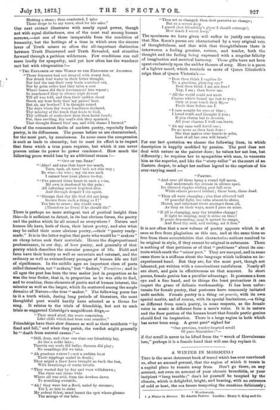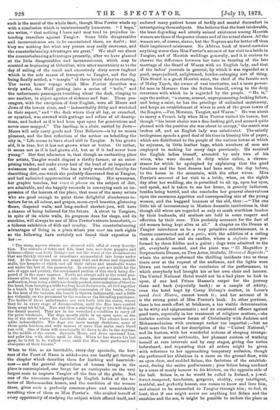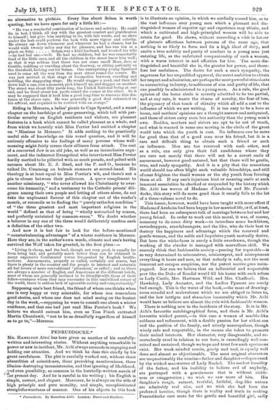A WINTER IN MOR,OCCat
Tars is the most deterrent book of travel which has ever convinced us, after an amused perusal, that the region of which it treats is a capital place to remain away from. Don't go there, on any account, not even on account of your chronic bronchitis, or your incipient "lung trouble ;" don't let yourself be tempted by the climate, which is delightful, bright, and bracing, with no extremes of cold or heat, the sea breeze tempering the sunshine deliciously ; • Wordsworth. t A Winter in Morocco. By Amelia Perrier. London : Henry S. King and Clo.
such is the moral of the whole book, though Miss Perrier winds up with a conclusion which is unintentionally humorous. "I hope," she writes, " that nothing I have said may tend to prejudice in- tending travellers against Tangier. Some little disagreeables and inconveniences are to be encountered there, no doubt ; but they are nothing but what any person may easily overcome, and the counterbalancing advantages are great." We shall see about the counterbalancing advantages presently, after we have glanced at the little disagreeables and inconveniences, which may be counted as beginning at Gibraltar, with utter uncertainty as to the day of sailing of the small and excessively dirty screw tugboat which is the sole means of transport to Tangier, and the day being finally settled, a "margin" of three hours' delay in starting. The seven hours' voyage which Miss Perrier describes was truly awful, the Wolf getting into a series of "boils," and the unfortunate passengers tumbling about the deck, clinging to one another, in abject agonies of sickness and fear. These pas- sengers, with the exception of four English, were all Moors and Jews of the lowest class, and "indescribably filthy and wretched in their aspect," and "the deck where they all lay, or crouched, or squatted, was strewed with garbage and refuse of all descrip- tions, and looked as if it had been spat upon for generations and never once mopped." The landing, in a chair, carried by Jews— Moors will only carry goods and True Believers—is by no means pleasant, and the first reflection of the author on beholding the city is, "Life seems to have stood still in Tangier. It has grown old, it is true, but it has not grown wiser or better. Or rather, it seems not as if it had grown old, but as if it had never been young." Her first admission is, that though an enchanting place for artists, Tangier would disgust a thrifty farmer, or an enter- prising trader, and make every hair of the head of an inspector of nuisances stand on end. She has a truly wonderful faculty for describing dirt, one which she probably discovered first at Tangier, and had unlimited opportunities of cultivating. Her synonyms, ber graphic touches, her tours de phrase on the subject of dirt, are admirable, and she happily succeeds in conveying such an im- pression of the horrors of the place, that none of the many artists who are good enough to paint those delightful slumberous in- teriors for us, all colour, and grapes, moon-eyed beauties, glistening floors, diapered walls, and long-necked sherbet-jars, will have a chance of being believed for the future. A. street in Tangiers, in spite of its white walls, its gorgeous dens for shops, and its sunshine, will always be one of Miss Perrier's streets henceforth,— a hideous exhibition of filth and cruelty. The counterbalancing advantages of living in a place where you must see such sights as the following have certainly not found their expositor in her :—
" The steep, narrow streets are strewed with offal of every descrip- tion. The entrails of fowls and fish, dead rats, new-born puppies and kittens—these cast forth living—are not the worst of the abominations that are thickly strewed or sometimes accumulated into heaps under foot. At the top of the street are many fruit and flower and vegetable stalls, the keepers of which cast all their refuse and unsaleable wares ant under the feet of the passers-by. In another part are stalls for the sale of eggs and poultry. the condemned portion of this stock being dis- posed of in the same manner. Fowls are always sold to the retail pur- chaser alive, but many die before sale from unnatural causes, such as suffocation, from being a little too closely packed, determination of blood to the head, from hanging a trifle too long head downwards, all tied together in a bunch by the legs, or occasionally concussion of the brain, when, in the heat of the bargain, the bunch is thrown indignantly, and a little too violently, on the pavement by the vendor or the intending purchaser. The bodies of these unfortunates are cast forth into the street, where they lie in every stage of decomposition, until the flies have carried them away bit by bit. Now and then a starving dog or two will dispute the dainty morsel. They are in too wretched a condition to carry off the prize wholesale. The dogs mostly abide in an open space at the top of the street where the butchers' stalls are. The odours here are quite indescribable. The dogs are mere mangy skeletons, some of them quite hairless, and with masses of sores that make one's blood run cold. One of them will occasionally lie down to die in the daytime in the middle of the street. Juvenile Moors and Jews surround him, and poke him with sticks until he dies. When he has drawn his last gasp, he is left to be walked over, until the flies have performed his obsequies at their leisure."
When to this, as an inevitable, every-day spectacle, the hor- rors of the Feast of Rams is added—one can hardly get through the chapter which describes them for loathing and heartsick- - neas — and the general degradation of human beings in the place is contemplated, one longs for an earthquake on the very largest scale to improve Tangier off the face of the globe. Not one of the numerous descriptions by English ladies of the in- terior of Mohammedan homes, and the condition of the women there, gives such a perfectly common-place and unmistakably revolting view of them as Miss Perrier's. She availed herself of every opportunity of studying the subject which offered itself, and endured many patient hours of bodily and mental discomfort in investigating these subjects. She believes that the least intolerable, the least degrading and utterly animal existences among Moorish women are those of the poorer classes and of the actual slaves. All the women are, of course, slaves, but the Negroes are far better off than their imprisoned mistresses. No African book of travel contains anything worse than Miss Perrier's account of her visit to a bride in Tangier, and of Moorish weddings generally, and it is curious to observe the difference between her tone in treating of the late marriage of the Sharif of Wazan with an English lady, and that of the ladies' journals in general, by which it was regarded as a good, unprejudiced, enlightened, border-enlarging sort of thing. This Sharif is a great Moorish saint, the chief of the fanatic sect of Muley Tayeb, the owner of vast territories, and a more power- ful man in Morocco than the Sultan himself, owing to the deep reverence with which be is regarded by the people. "He is," says the author, "a coarse, sensual, unprepossessing-looking fellow, and being a saint, he has the privilege of unlimited matrimony, and keeps an establishment of wives in each of the great towns of the Empire,—Fez, Morocco, Tangier, and Wazan." He was about to marry a French lady when Miss Perrier visited his harem, but though "his latest choice was a fine-looking girl, and seemed quite pleased with the position she was about to occupy," the match was broken off, and an English lady was substituted. The saintly bridegroom spends a good deal of his time in blessing bits of paper, which are distributed to the people of the various towns at which he sojourns, in little leather bags, which numbers of men are employed in making for many days previously. He received the English ladies himself, attended by only two of his wives, who were dressed in dirty white calico, a circum- stance for which he apologised by explaining that the good furniture and the best dresses had been sent, the day before, to the house in the mountain, with the other wives. Miss Perrier's account of her visit to a bride, when, on the eighth day after her wedding, she is permitted to sit up, open her eyes, and speak, and is taken to see her house, is gravely ludicrous, besides being horrid, and she concludes her general observations upon the enormous appetites and corresponding size of the young women, and the haggard leanness of the old, thus :—" The one little bit of inconsistency in Moslem domestic institutions is, that though old wives are regarded as only so much-worthless lumber by their husbands, old mothers are held in some respect and affection by their sons. This probably accounts for the fact of old women being kept alive at all." A chapter on the Drama at Tangier introduces us to a very primitive entertainment, in a theatre constructed out of a patio, with the addition of a ceiling with a chandelier and six candles, where a sinfonia was per- formed by three fiddles and a guitar ; dogs were admitted to the pit, everybody smoked, and the piece was "El Magnifico y Sorprendente Drama, en Tres Actos, titulado, Merino el Regicida ;" where the actors performed the thrilling incidents two or three times over at the request of the audience, and the lights were blown out instantly on the conclusion of the performance, to which everybody had brought his or her own chair and lantern. The United National Hotel would not be a bad place to look in upon, if one had Prince Hassan's carpet for the journey there and back (especially back); as a sample of oddity, even the hotel kept by Corny Delany's mother, in Lever's novel Jack Hinton, cannot touch it ; and her account of it is the strong point of Miss Perrier's book. In other portions, there is too much effort at briskness, a too visible determination to be witty and epigrammatic ; and an occasional offence against good taste, especially in her treatment of religious matters,—she includes certain narrow forms of Christianity with Judaism and Mohammedanism with contempt rather too impartial ;—but no fault mars the fun of her description of the "United National," and its hostess, with her wonderful notions of sleeping arrange- ments, her mental arithmetic, her pleasant custom of washing herself at rare intervals and by easy stages, giving due notice beforehand, and requesting that all orders might be given with reference to her approaching temporary seclusion, though she performed her ablutions in a room on the ground floor, with an open door, and scolded Selam, the factotum of the establish- ment, during the entire performance ; poor Selam being confined by a sense of manly honour to his kitchen, on the opposite side of the hall. Selam is, as he would be called in Ireland, a jewel. Sweet-tempered, handsome, gorgeous, shabby, very intelligent, truthful, and perfectly honest, one comes to know and love him, and almost to be reconciled to Tangier through him ; to feel, at least, that if one might never see anything but Selam and the sunshine and the sea, it might be possible to endure the place as
an alternative to phthisis. Every line about Selam is worth quoting, but we have space for only a little bit :—
" He was a wonderful combination of laziness and activity. He could lie in bed, I think, all day with the greatest comfort and gratification to himself; but give him anything to do, with fair words, and no slave under the lash could perform the task with more vigour and celerity. He always sat down whenever and wherever he had a chance, but ho would walk twenty miles any day for pleasure, and has run ten at a
pinch on duty Selam,was a kind husband, and treated his wife —he had but one—well. He had no children, but ho. was remarkably fond of the little ones, and all the children in the street knew him well ; so that it was seldom that there was not some small Moor, Jew, or Gentile, toddling or crawling about the doorway, or sitting patiently on the threshold, looking out for Selam. One enterprising young Spaniard used to come all the way from the next street round the corner. Ho was just arrived at that stage of locomotion between crawling and toddling, the staggering stage. He would stagger a yard, and then fall down half a one, rest a moment, pick himself up, and stagger on another. The street was about fifty yards long, the United National being at one end, and he lived about ten yards round the corner at the other. So it may be supposed that it took him a good long time to traverse this dis- tance at the above rate. Ho was generally a good deal exhausted on his afrival, and required to be revived with an orange."
Riding in Morocco, a ladies' picnic to Cape Spartel, and a smart chapter on the hardships of game-preserving, which tell with par- ticular severity on English residents and visitors, are pleasant
features in a book which cannot be called pleasant as a whole, and
from which we heartily wish Miss Perrier had omitted a chapter on "Missions in Morocco." It adds nothing to the practically useful side of knowledge on this vexed question, and it will be seriously offensive to the feelings of many persons whose well- meaning might fairly screen their silliness from attack. The cost of a converted Jew is an old joke, as well as an inconcluaive argu- ment, and the indiscreet Evangelical who interviewed Miss Perrier hardly merited to be pilloried with so much parade, and pelted with sarcasm about Mr. E. J. Reed, and the P. and 0., because he talked Dr. Cumming on bulrush steamers at second-hand. His theology is at least equal to Miss Perrier's wit, and there's not a pin to choose between their politeness. A queer compliment to another missionary, "who never allowed his Christianity to over- come his humanity," and a testimony to the Catholic priests' dili- gence among their own people and letting of others alone, do not take the unpleasant flavour of this chapter out of the reader's mouth, or reconcile us to finding the "purely orthodox condition"
of "the three greatest and most important religions in the world" defined as that of being "wholly untouched by reason, and perfectly untainted by common-sense." We doubt whether a believer in any one of the three would deliberately confirm such a definition of the other two.
And now it is but fair to look for the before-mentioned
4' counterbalancing advantages" of a winter residence in Morocco. Here they are, in the author's own words, climate and one's having survived the Wolf taken for granted, in the first place :— " Living is cheap, and the food, though not very good, is equally far from being bad, and probably much better than can be obtained in many expensive Continental towns frequented by English health- seekers. Amusements, properly so called, certainly are scarce, but -there is plenty in the country and the people to interest and entertain all but lovers of mere conventional pleasures,' so called ; and as there are always a number of English and Americans at the different hotels, most of whom are generally inclined to be friendly+with those of their fellow-creatures whom they may encounter in this uncivilised corner of the world, there is seldom lack of agreeable society and companionship."
Supposing one's best friend, the friend of whom one thinks when one is very happy or very miserable, for whom one remembers good stories, and whom one does not mind seeing on the busiest -day in the week,—supposing he were to consult one about a winter residence, and that one had just read Miss Perrier's book ? We believe we should entreat him, even as Tom Pinch entreated Martin Chuzzlewit, "not to be so dreadfully regardless of himself as to go to,"—Morocco.




































 Previous page
Previous page